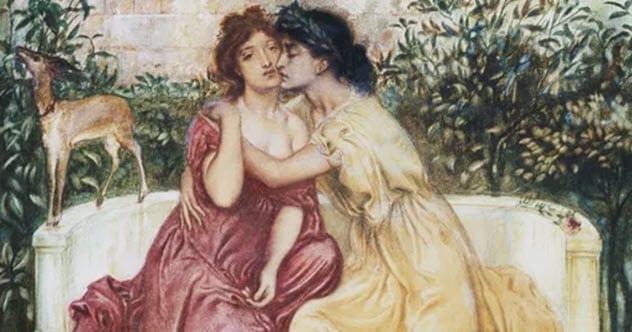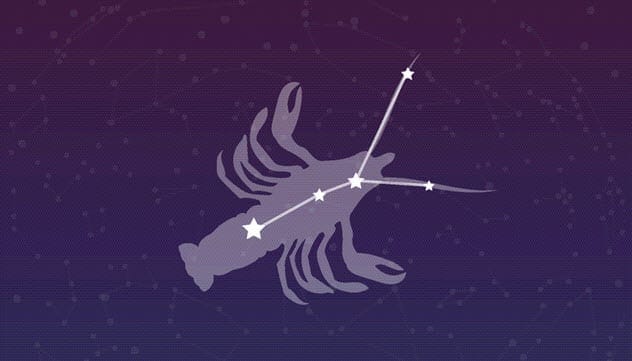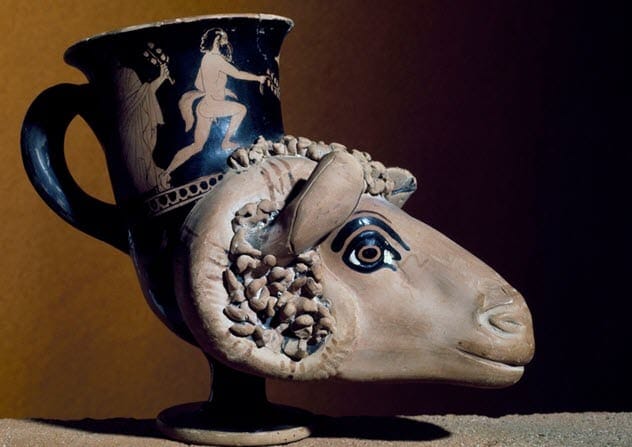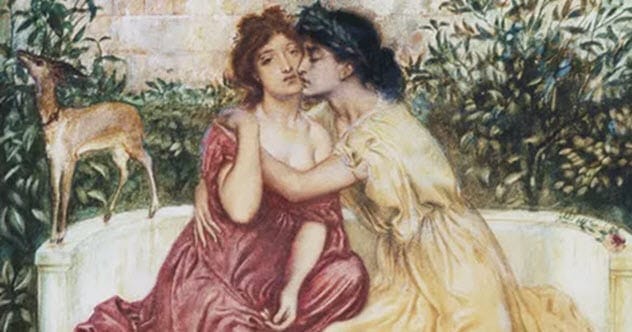The English language is a fascinating mix of different cultures and histories. It’s no wonder we have so many words with strange and unexpected origins. Learning about where our words come from can give you a whole new appreciation for the language we use every day.
Here are 10 English words with weird histories that might just surprise you!
Lesbian

The word “lesbian,” referring to women who love other women, comes from the Greek island of Lesbos. Around 600 BC, the poet Sappho lived there. While most of her poetry is lost, fragments reveal her passionate writings about women, leading to speculations about her sexuality.
Some believe she was married with a daughter named Cleis, while others suggest Cleis was Sappho’s lover. Interestingly, her supposed husband’s name, Kerkylas, is close to the Greek word for “penis,” and his island, Andros, sounds like “man,” hinting that the story might be a joke.
Assassin

An “assassin” is someone who murders for money or ideology. The word’s origin traces back to the Crusades. The Nizari Ismaili, a sect of fanatical Muslims in Lebanon, were known for murdering leaders who opposed them. Western Europeans believed they committed these acts after consuming hashish, earning them the nickname hashishin (“hashish user”).
The word evolved through Italian and French before becoming “assassin” in English.
Walrus

Before writing The Lord of the Rings, J.R.R. Tolkien worked on the Oxford English Dictionary. While researching words beginning with “W,” he investigated “walrus.” He concluded that “walrus” likely came from hrossvalir, an Old Norse term meaning “horse-whale.”
The “whale” part makes sense due to the walrus’s size and flippers. The “horse” part, however, is more mysterious and might simply be the closest comparison someone could make to a land animal at the time.
Quarantine

We’ve all heard the word “quarantine,” especially recently. It comes from the Italian word quarantino (“40-day period”). During the plague, Venetian authorities wouldn’t allow ships from affected areas to enter ports until 40 days had passed. The intention was to prevent the spread of the disease.
The number 40 was likely chosen due to its religious significance in Christianity. Medieval Christians believed Jesus fasted for 40 days in the desert, and Noah’s Ark experienced 40 days and nights of rain. The idea of purification through a 40-day period aligned with these beliefs.
Nimrod

Today, “Nimrod” is often an insult for someone clumsy or foolish. However, Nimrod was a mighty hunter in the Bible and Noah’s great-grandson. The shift in meaning happened in the 1980s, possibly due to Bugs Bunny cartoons.
Bugs sarcastically called the inept hunter Elmer Fudd “Nimrod,” comparing him to the skilled biblical figure. Young audiences misunderstood the sarcasm, leading “nimrod” to become a term for someone clumsy or foolish.
Muscle

It may seem strange, but “muscle” actually comes from the Latin word musculus, meaning “little mouse.”
Ancient people thought that a flexed bicep resembled a tiny mouse moving under the skin.
Cancer

The connection between the astrology sign Cancer and the disease is based on crabs. “Cancer” comes from the Latin word for “crab.” The Cancer astrological sign is based on a constellation that’s supposed to look like a crab.
In Greek mythology, Heracles (Hercules) crushed a giant crab during his battle with Hydra. Hera honored the crab by placing it among the stars. The disease got its name because a cancerous growth, with its swollen veins, resembled a crab with legs extending from its body.
Malaria

Malaria is a disease spread by mosquitoes, but its name comes from a misunderstanding about its cause. Before people knew mosquitoes were responsible, the miasma theory suggested that diseases like malaria were caused by toxic vapors from decaying matter.
“Malaria” comes from the Italian mala aria (“bad air”). These vapors were often linked to marshes, where a lot of decaying matter was found. Of course, the real reason was that mosquitoes lay their eggs in the standing water found in marshes.
Tragedy

The word “tragedy” is derived from the Greek words tragos and oidos, meaning “goat song.”
The connection to goats may come from plays involving satyrs (nature spirits that were part human, part goat or horse). Satyr plays often accompanied tragic plays and were dramatic, yet funny.
Candidate

These days, political candidates are often associated with scandal. In ancient Rome, candidates wore white togas. These togas were specially made to be very white, leading to the men being called candidati (“whitened men”).
The term comes from the Latin word candidus (“pure white”). Interestingly, this is also the basis for the word Candida, a type of fungus that’s white and can cause thrush.
The stories behind words can be just as captivating as any historical event. Who knew language could be so interesting?
What’s your favorite weird word origin? Share in the comments below!










